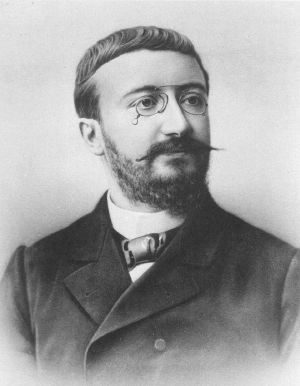Alfred Binet
Alfred Binet (July 8, 1857 – October 18, 1911), French psychologist and inventor of the first usable intelligence test, the basis of today's IQ test.
Born in Nice, Binet was a French psychologist who published the first modern intelligence test, the Binet-Simon intelligence scale, in 1905. His principal goal was to identify students who needed special help in coping with the school curriculum. Along with his collaborator Theodore Simon, Binet published revisions of his intelligence scale in 1908 and 1911, the last appearing just before his untimely death. A further refinement of the Binet-Simon scale was published in 1916 by Lewis M. Terman, from Stanford University, who incorporated the German psychologist William Stern's proposal that an individual's intelligence level be measured as an intelligence quotient (I.Q.). Terman's test, which he named the Stanford-Binet Intelligence Scale formed the basis for one of the modern intelligence tests still commonly used today. They are all colloquially known as IQ tests.
Binet and chess
In 1894, Binet conducted one of the first psychological studies into chess. It investigated the cognitive facilities of chess masters. Binet hypothesised that chess depends upon the phenomenological qualities of visual memory but after studying the reports by master participants, it was concluded that memory was only part of the chain of cognition involved in the game process. The players were blindfolded and required to play the game from memory. It was found that only masters were able to play successfully without seeing the board for a second time and that amateur or intermediate players found it to be an impossible task. It was further concluded that experience, imagination and memories of abstract and concrete varieties were required in grand master chess. The line of psychological chess research was followed up in the 1950s by Reuben Fine and in the 1960s by Adriaan de Groot.
Publications
- La psychologie du raisonment; Recherches expérimentales par l'hypnotisme (1886; English translation, 1899), his first book.
- Perception intérieure (1887).
- Etudes des psychologie expérimentale (1888).
- Les altérations de la personnalité (1892; English translation, 1896).
- Introduction à la psychologie expérimentale (1894; with co-authors).
- On Double Consciousness (1896).
- La fatigue intellectuelle (1898; with co-author Henri).
- La Suggestibilité (1900).
- Etude expérimentale de l'intelligence (1903).
- L'âme et la corps (1905).
- Les révélations de lécritique d'après un contrôle scientifique (1906).
- Les enfants anormaux (1907; with co-author Simon).
- Les idées sur les enfants (1900).
He was one of the editors of L'année psychologique, a yearly volume comprising original articles and reviews of the progress of psychology.
External links
- Human Intelligence: Alfred Binet
- Works by Alfred Binet. Project Gutenberg
- Binet's Self-Consciousness
- New Methods for the Diagnosis of the Intellectual Level of Subnormals by Alfred Binet
- Le Magnetisme Animal by Alfred Binet
Credits
New World Encyclopedia writers and editors rewrote and completed the Wikipedia article in accordance with New World Encyclopedia standards. This article abides by terms of the Creative Commons CC-by-sa 3.0 License (CC-by-sa), which may be used and disseminated with proper attribution. Credit is due under the terms of this license that can reference both the New World Encyclopedia contributors and the selfless volunteer contributors of the Wikimedia Foundation. To cite this article click here for a list of acceptable citing formats.The history of earlier contributions by wikipedians is accessible to researchers here:
The history of this article since it was imported to New World Encyclopedia:
Note: Some restrictions may apply to use of individual images which are separately licensed.
